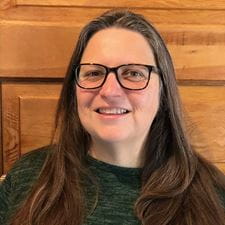
Forging her own path leads Dr. Ramona Olvera to postdoc position with CATALYST
By Tyler Griesenbrock
CATALYST scientific editor
Published July 10, 2023
 For Ramona Olvera, PhD, MA, a position as a post-doctoral researcher was never part of the plan – until she found a home with CATALYST, the Center for the Advancement of Team Science, Analytics, and Systems Thinking in Health Services and Implementation Science Research, at The Ohio State University.
For Ramona Olvera, PhD, MA, a position as a post-doctoral researcher was never part of the plan – until she found a home with CATALYST, the Center for the Advancement of Team Science, Analytics, and Systems Thinking in Health Services and Implementation Science Research, at The Ohio State University.
“Coming from the social sciences, particularly sociology, the concept of a postdoc was: ‘Why would you do that?’” Dr. Olvera said. “Most people can get out (of a doctoral program) knowing enough about their topic to get a job in academia.”
Dr. Olvera received her BA in sociology from Wells College and completed graduate course work in sociology at Boston University. She earned a master’s degree in social policy/women and gender studies and her PhD in social policy from The Heller School of Social Policy and Management at Brandeis University.
She conducted her PhD dissertation research using participant observation with immigrant women in the crabmeat picking industry in Maryland, and with their families in Mexico. Other adventures took her to Massachusetts, Louisiana, Puerto Rico, the Dominican Republic, and South Africa.
“I really love university teaching, and I worked in universities off and on through this time period,” Dr. Olvera said.
Along the way, she collected years of experience conducting qualitative, survey, and mixed-methods research; she also spent time at a think tank. That variety of experiences helped confirm her preference for working on multiple projects rather than on a single effort.
“When I moved to Ohio, I got position as a chair of a social science department at a community college, overseeing about 40 faculty in the social sciences and humanities,” Dr. Olvera said. “But I really wanted to get back to research.”
About three years ago, a new opportunity arose and she joined an effort working to address the opioid overdose crisis called the HEALing Communities Study. It is a project that features the contributions of many CATALYST faculty and staff members, and it was her first introduction to the Center.
The idea of taking on a postdoctoral role with CATALYST came up in conversation with Ann Scheck McAlearney, ScD, MS, the Executive Director of CATALYST, Associate Dean for Health Services Research, and Distinguished Professor in the Department of Family and Community Medicine.
“I had so much experience before I came to CATALYST that, in my head, I thought: ‘This is not what you do when you have this kind of experience,’ ” she said. “I thought of postdocs as what you do straight out of school ... to get some work experience prior to going into an academic job.”
But after working with CATALYST members from the HEALing Communities Study, Dr. Olvera knew the skills, experiences, and journeys of others at the Center varied widely. Those initial conversations with Dr. McAlearney offered a route to fulfill a dream she had so far deferred.
“The situation in CATALYST is such that my skills and experience are valued. The postdoctoral position for me is an opportunity to learn more about health services and implementation science,” she said. “I have always thought about being a faculty member conducting research at an institution, and I had not totally given up on that dream, but it was getting harder and harder for me to see a path.”
After agreeing to come on board, Dr. Olvera was able to continue her existing work and build skills as she became a member of many other project teams. Rather than focusing on a single topic, the breadth of work underway at CATALYST allowed her to accrue experience across multiple subject areas.
“I’ve been excited by the projects I’ve been on in CATALYST. I’ve learned about palliative care. I’ve helped with a manuscript on kidney disease. … I get a little bit of knowledge on things that are interesting,” she said. “Usually, I think the postdoc mentor-mentee relationship is about what the mentor is studying at that moment. (Dr. McAlearney) is on so many different kinds of projects. She’s very good at finding a person’s skills and matching them with what CATALYST needs at that moment.”
The decision to make the leap has been a rewarding one for her.
“The people I have worked with in CATALYST have been some of the best people I‘ve ever worked with. CATALYST has been growing, so there are a lot of opportunities on a lot of different projects,” she said. “My experience and life journey are taken into account.”
Looking ahead on that journey, Dr. Olvera is excited about what is still to come.
“I’m potentially going to be mentoring an undergraduate soon, so there are opportunities for growth in other ways,” she said. “I like that I can bring everything, all of my background, all my knowledge. … The CATALYST team wants everyone’s background to be shared.”
As for advice for others who may be following their own nontraditional paths to a postdoc position, Dr. Olvera emphasized that working in CATALYST gave her the opportunity to build a more self-directed path while working with people who are dedicated to their work in a team science setting.
“People need to be confident enough to talk about what their needs and desires and wants are,” she said. “You can build your skills by exploring what you need to. It’s more self-directed and less imposed on you than traditional postdoc positions. … There are a lot of opportunities.”
For more information about CATALYST, visit go.osu.edu/catalyst.
